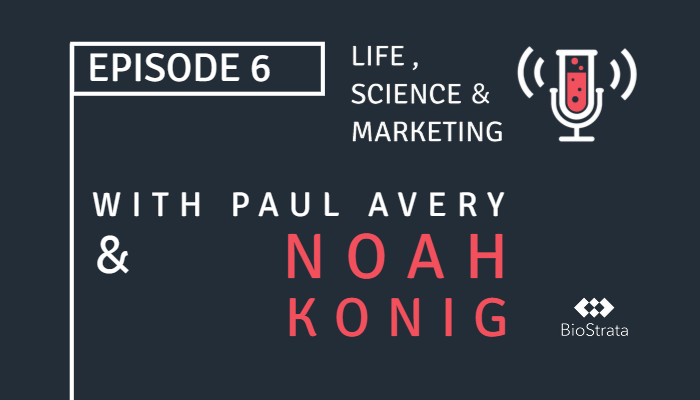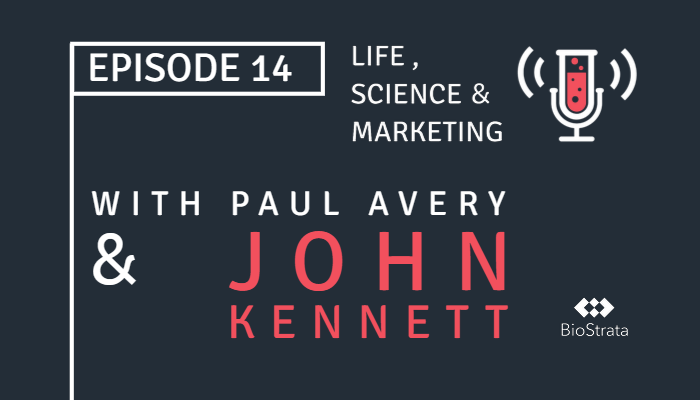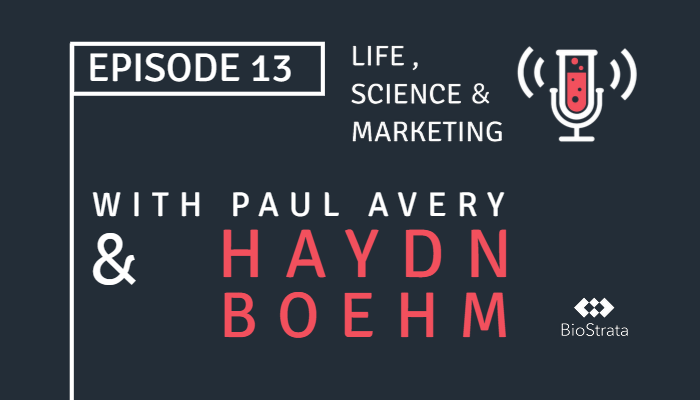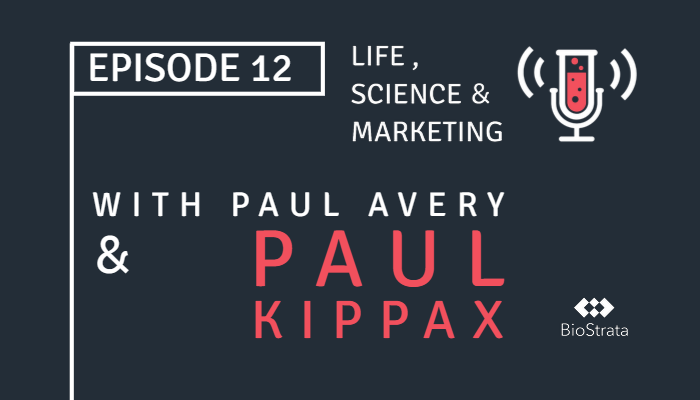Noah Konig: Combining psychology and marketing in life science, reaching niche expert audiences, and balancing confidence with continual learning
Our "Life, Science and Marketing" podcast features revealing discussions between host and BioStrata CEO Paul Avery and accomplished marketing professionals across the life sciences industry. In each episode, guests discuss their backgrounds, experiences, and advice on marketing strategies and best practices.
In episode 6, Paul had an insightful conversation with Noah Konig, Marketing Director at PrecisionLife. With a unique dual degree in psychology and marketing, Noah shared how blending human behaviour knowledge with strategic marketing skills has fuelled his career. He provided valuable perspectives on conveying complex sciences effectively, penetrating hard-to-reach expert audiences, and balancing confidence with continual learning.
Read on for a summary of episode 6 and Noah’s journey leveraging his multidisciplinary training in psychology and marketing to drive success in life science marketing roles. You can also listen to the full discussion in the podcast episode below or find us on your favourite podcast platform.
What did your psychology and marketing degree entail?
Noah Konig: I completed a dual honours degree in psychology and marketing at Keele University. This meant I was essentially studying for two full degrees at the same time. At the time, I didn't realise this and thought I was just doing half of each discipline.
The psychology side provided extensive training in understanding human behaviour, cognition and the underlying neurological processes. Core courses covered topics like neuroscience, cognitive psychology, sensation and perception, emotion, and psychological disorders. A major component involved learning research methods and statistical analysis to be able to design studies, collect behavioural data, and draw insights from the results. This provided a strong foundation in areas like critical thinking, data analysis, statistics, and empathy.
The marketing side complemented this by teaching essential skills like positioning, segmentation, branding, communications, and advertising. Key courses included consumer behaviour, market research, integrated marketing campaigns, and services marketing. This enabled me to hone vital marketing abilities including positioning products effectively, dividing audiences into targetable segments, developing cohesive branding strategies, communicating messages effectively, and running data-driven campaigns.
Combining the two disciplines provided both the human behavioural insights from psychology as well as the strategic marketing capabilities to apply them.
Why did you choose this combination degree?
Noah Konig: I couldn't decide between pursuing a career in psychology or marketing, so the dual degree provided the perfect way to explore both interests simultaneously. I've been fortunate that this diverse background has enabled me to draw on knowledge from both disciplines throughout my career in life sciences marketing.
The psychology training has proven invaluable for deeply understanding human behaviour, emotions, motivations and decision-making. This helps me create messaging that resonates with and persuades specific audiences. The research skills help inform strategy with real data and insights.
The marketing teachings have allowed me to position products strategically, identify and segment target audiences, develop branding frameworks and communicate compelling messages across a variety of channels. These abilities have been essential for successfully promoting complex technologies and services in the life sciences industry.
What was the most interesting product or business you've worked on and why?
Noah Konig: At Cambridge Cognition, we were pioneering the use of emerging technologies like wearables and voice analysis to detect biomarkers and monitor clinical trials in more continuous, real-world settings. For example, we developed smartphone apps and partnered with wearable companies to collect data during trials. This enabled trial participants to be monitored daily, as they went about normal activities in their home, rather than only during periodic site visits.
We were also ahead of the curve in exploring the use of voice recordings to identify early acoustic signs of cognitive decline based on speech patterns. This had enormous potential as a scalable screening tool for neurological diseases.
More recently at PrecisionLife, we have an incredible mission to expand precision medicine into highly complex diseases like dementia, diabetes, cardiovascular disease and autoimmune disorders. Currently precision medicine has made significant advances in areas like rare disease and oncology. However, translating these personalised approaches into multifactorial common diseases has proven extremely challenging. Our AI-powered platform can finally unlock this opportunity by unravelling the combinations of genetic and environmental factors driving individuals' disease profiles. This promises to transform drug discovery by identifying novel targets and biomarkers. It also enables more tailored diagnostic testing and treatment selection for patients. Having the opportunity to participate in this level of innovation and potential to impact millions of lives is truly special.
Can you share some of the details around some of what you’re doing at PrecisionLife currently?
Noah Konig: At PrecisionLife, we are using our AI platform to stratify patients with Alzheimer's disease into more targeted subpopulations based on the specific disease drivers for each individual. For example, within a cohort of 1,000 Alzheimer's patients, our technology may identify one segment of 300 patients whose disease is driven predominantly by genetic factors. Another segment of 400 patients may have Alzheimer's resulting more from environmental and lifestyle factors.
By unravelling these complex combinations of elements underlying individuals' Alzheimer's, we can match patients to the treatments most likely to be effective for them. This allows drug developers to design more targeted trials and therapies for each stratified population. It also enables clinicians to select the right precision treatment for each patient from the start, rather than pursuing a trial and error approach.
This level of segmentation and personalised positioning of treatments is at the core of how we are evolving precision medicine's impact in complex neurological diseases like Alzheimer's. My experience in strategic audience division and messaging development has been critical for bringing this approach to fruition.
What do you love about building your career in the life sciences industry?
Noah Konig: I’m motivated every day by the sense of purpose and the incredible innovations in the life sciences industry. The technologies and therapies we get to be a part of have huge implications for improving patient lives and transforming healthcare.
Working in this space, even on the business side, allows you to contribute to advances that can benefit millions of people. I feel fortunate to apply my marketing expertise to companies truly pushing the boundaries of what’s possible in areas like genetic medicine, AI, and drug discovery.
Knowing that my work helps bring groundbreaking new treatments and diagnostics to patients provides an unparalleled sense of fulfilment in my career. I wouldn’t trade it for anything else.
What has been the hardest thing about science marketing and how have you overcome it?
Noah Konig: Some of the fundamentals like positioning and segmentation become particularly complex when marketing intricate technologies and services in life sciences. The concepts, mechanisms, data and value propositions can be highly technical. This makes succinctly defining the core positioning and differentiating factors difficult. It also complicates dividing audiences into meaningful segments that allow tailored messaging when the market is highly specialised.
Reaching the right decision makers and influencers is also incredibly challenging. We need to penetrate small groups of incredibly busy experts across pharmaceutical R&D, biotech and healthcare providers. However, I've improved audience targeting through directly engaging with key leaders at scientific conferences and events to understand their priorities and pain points. This helps inform content development and channel strategies.
I've also found it critical to combine traditional tactics like publications, conferences and trade media with advanced digital campaigns. Peer-reviewed journals, poster sessions and speaking opportunities help establish credibility and get on scientists' radars. Meanwhile, programmatic ads, retargeting and nurture campaigns allow consistent connection outside of these channels. Testing and optimising various formats is key to resonating amid overflowing inboxes.
How have scientific conferences and events helped you engage niche expert audiences?
Noah Konig: Scientific conferences and tradeshows provide invaluable opportunities to directly interact with key opinion leaders and experts from across biopharma R&D, healthcare, and technology.
By attending sessions and presentations, I’m able to gain insights into the latest research, industry trends, and innovators’ priorities and challenges. Speaking with attendees also allows me to get direct feedback on how PrecisionLife can address their needs.
Beyond absorbing insights, these events offer a chance to establish credibility and relationships by sharing our work through presentations and scientific posters. They also enable productive one-on-one partnership discussions to explore collaborative opportunities.
Immersing myself in the environments where our target audiences congregate has been hugely beneficial both for gathering market intel to inform strategy and making direct connections to drive business impact. Scientific conferences and events are an irreplaceable platform for engaging such niche groups of busy experts.
What are your top marketing tips for others?
Noah Konig:
- Overcommunicate: Bring people along on the marketing journey. Regularly report progress and outcomes to stakeholders across the company. This builds buy-in, credibility and an understanding of marketing's immense value.
- Balance confidence: Believe in yourself and your expertise but maintain modesty and some imposter syndrome to stay hungry and grounded.
- Immerse in the audience: Attend conferences, read publications and directly engage with them. This provides invaluable insights into pain points and interests that should guide your strategy.
- Combine traditional and digital: Leverage core tactics like conferences, journals and media along with advanced digital campaigns. This allows credibility-driven and volume-driven touchpoints to penetrate effectively.
- Test and optimise: Continuously experiment with new concepts, offers, messages and formats. Measurement and analytics should inform optimisation.
If you could go back in time, what professional advice would you give your younger self?
Noah Konig: I'd advise myself to have more confidence in my abilities rather than succumbing to imposter syndrome. Early in my career, I constantly feared being exposed as underqualified or making mistakes that would get me fired. However, I had to realise that I was hired for good reasons and brought very specialised skills in marketing strategy, positioning and messaging. These were highly valued in the life sciences even without deep scientific expertise.
I should have trusted that I had earned my place at the table and could provide immense value through my unique marketing perspectives. Having confidence in my skills and experience would have helped me take more risks and become an even stronger contributor faster.
At the same time, I can't eliminate self-doubt completely. A bit of imposter syndrome provides helpful humility and continual motivation to learn and improve. The key is balancing reasonable confidence in my competencies with modesty, openness, and the hunger to keep developing as a marketer and leader.
Discover more insights with the Life, Science & Marketing Podcast
As we conclude this discussion with Noah Konig, we'd like to thank him for sharing his wisdom and experiences. Noah is always eager to engage in more conversations, answer questions, and share insights from his career journey and expertise. You can connect with him on LinkedIn or email him at noah@precisionlife.com.
Stay tuned for the next insightful episode of the "Life, Science and Marketing" podcast. We're excited to continue bringing you practical advice and perspectives from top professionals in our field.
You can also follow the official Life, Science and Marketing LinkedIn page to keep up with the latest podcast news, episodes and marketing insights.





